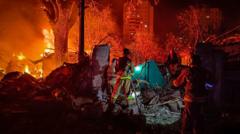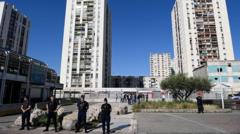In a tragic escalation of violence, three Colombian soldiers were killed during a drone attack attributed to dissident rebel groups in the country's south-west. The incident occurred while they were stationed at a checkpoint along the Naya River, supporting navy personnel in the region. Authorities have confirmed that four additional soldiers sustained injuries as a result of the assault.
Three Colombian Soldiers Killed in Drone Strike Attributed to Rebel Forces

Three Colombian Soldiers Killed in Drone Strike Attributed to Rebel Forces
A deadly aerial assault involving explosive drones in Colombia has claimed the lives of three soldiers, as tensions rise with dissident factions.
Drone warfare has intensified in Colombia, with a notable surge in attacks—115 incidents recorded in 2024 alone—primarily executed by illegal armed groups. In response to this growing threat, the Colombian government announced plans to enhance its anti-drone capabilities earlier this year to better identify and neutralize potential aerial threats.
The attack took place near Buenaventura, a crucial point for drug trafficking activities. The three fallen soldiers have been identified as Wilmar Rivas, Andrés Estrada, and Dario Estrada. The area is known for the presence of dissident armed factions, notably those stemming from the Farc guerrilla group, which rejected a peace agreement established in 2016.
Military officials reported that the operation was conducted by a group led by a dissident leader known as Iván Mordisco, who abandoned government peace negotiations in April 2024. His factions engage in various criminal enterprises, including drug trafficking, extortion, and illegal mining. As Colombian security forces face increased dangers, the recent assault highlights the ongoing challenge of confronting organized crime in the region.
The attack took place near Buenaventura, a crucial point for drug trafficking activities. The three fallen soldiers have been identified as Wilmar Rivas, Andrés Estrada, and Dario Estrada. The area is known for the presence of dissident armed factions, notably those stemming from the Farc guerrilla group, which rejected a peace agreement established in 2016.
Military officials reported that the operation was conducted by a group led by a dissident leader known as Iván Mordisco, who abandoned government peace negotiations in April 2024. His factions engage in various criminal enterprises, including drug trafficking, extortion, and illegal mining. As Colombian security forces face increased dangers, the recent assault highlights the ongoing challenge of confronting organized crime in the region.















